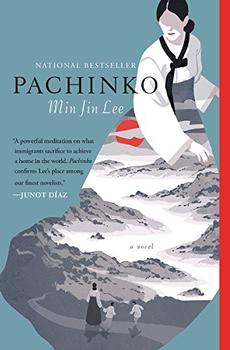Summary | Excerpt | Reading Guide | Discuss | Reviews | Beyond the book | Read-Alikes | Genres & Themes | Author Bio

A new tour de force from the bestselling author of Free Food for Millionaires, for readers of The Kite Runner and Cutting for Stone.
Pachinko follows one Korean family through the generations, beginning in early 1900s Korea with Sunja, the prized daughter of a poor yet proud family, whose unplanned pregnancy threatens to shame them all. Deserted by her lover, Sunja is saved when a young tubercular minister offers to marry and bring her to Japan.
So begins a sweeping saga of an exceptional family in exile from its homeland and caught in the indifferent arc of history. Through desperate struggles and hard-won triumphs, its members are bound together by deep roots as they face enduring questions of faith, family, and identity.
Although some of the central events of the novel, like World War II and the atomic bomb drop at Nagasaki, are familiar territory for fiction, Lee prioritizes out-of-the-ordinary perspectives: her Korean characters are first the colonized, and then the outsiders trying to thrive in a foreign country despite segregation and persecution. I recommend Pachinko to readers of family sagas and anyone who wants to learn more about the Korean experience...continued
Full Review
(715 words)
This review is available to non-members for a limited time. For full access,
become a member today.
(Reviewed by Rebecca Foster).
"If you are a rich Korean, there's a pachinko parlor in your background somewhere," Min Jin Lee writes in her novel Pachinko. Several of her Korean characters end up working in pachinko parlors, despite their differing levels of education and their previous experience.
Pachinko is essentially an upright pinball machine. Gamblers pay to borrow a set of small steel balls that are loaded into the contraption. Pressing a spring-loaded handle launches them onto a metal track lined with brass pins and several cups. The aim is to bounce the balls off the pins and get them to land in the cups before they fall down the hole at the bottom. A ball landing in a cup triggers a payout, in the form of extra balls dropping into the tray at the ...
This "beyond the book" feature is available to non-members for a limited time. Join today for full access.

If you liked Pachinko, try these:

by Eve J. Chung
Published 2025
A propulsive, extraordinary novel about a mother and her daughters' harrowing escape to Taiwan as the Communist revolution sweeps through China, by debut author Eve J. Chung, based on her family story.

by Abraham Verghese
Published 2025
Winner: BookBrowse Fiction Award 2023
From the New York Times–bestselling author of Cutting for Stone comes a stunning and magisterial epic of love, faith, and medicine, set in Kerala, South India, and following three generations of a family seeking the answers to a strange secret